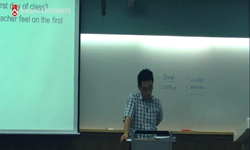This study investigated the pragmatic aspects of ellipsis in discourse, the facility of which, as one component of communicative competence, can be of great importance for successful communication. The purposes of this study were to find out significa...
http://chineseinput.net/에서 pinyin(병음)방식으로 중국어를 변환할 수 있습니다.
변환된 중국어를 복사하여 사용하시면 됩니다.
- 中文 을 입력하시려면 zhongwen을 입력하시고 space를누르시면됩니다.
- 北京 을 입력하시려면 beijing을 입력하시고 space를 누르시면 됩니다.
https://www.riss.kr/link?id=A109041399
- 저자
- 발행기관
- 학술지명
- 권호사항
-
발행연도
2008
-
작성언어
-
- 주제어
-
KDC
740
-
자료형태
학술저널
-
수록면
99-131(33쪽)
- 제공처
-
0
상세조회 -
0
다운로드
부가정보
다국어 초록 (Multilingual Abstract)
This study investigated the pragmatic aspects of ellipsis in discourse, the facility of which, as one component of communicative competence, can be of great importance for successful communication. The purposes of this study were to find out significance of ellipsis phenomena in communication and to find its implications for improving discourse competence of Korean learners of English. For these purposes, it discussed previous research, theories on economy of language and the theoretical models of formality and informality, defining the meaning of discourse and ellipsis, and examining the characteristics, motivation and types of ellipsis.
The findings of this study suggested that Korean students be given opportunities to acquire sociolinguistic and discourse competence in addition to the linguistic competence by letting the students have speaking activities, using economy of expression and avoiding complete sentences when one word or simple forms of expressions are sufficient for certain interactions. The opportunities could enable the students to produce language that is more context appropriate than the language they probably now produce. It stimulates students to speak more authentically in ways that approximate natural communication, to avoid stilted and unnatural language use in their conversational interactions.
목차 (Table of Contents)
- I. 서론
- II. 담화 속의 생략과 언어 경제
- III. 담화에서의 언어표현 양식과 생략
- IV. 생략의 특성, 동기 및 유형
- V. Conclusion
- I. 서론
- II. 담화 속의 생략과 언어 경제
- III. 담화에서의 언어표현 양식과 생략
- IV. 생략의 특성, 동기 및 유형
- V. Conclusion
- 참고문헌
동일학술지(권/호) 다른 논문
-
A Discourse Analysis of Language Scaffolding: In a Cross-age Tutoring Program
- 한국영어교육연구학회
- Ji-young Kim
- 2008
-
A Case Study of Korean Teaching through Reflection: Implications for Language Teacher Education
- 한국영어교육연구학회
- Yon-Soo Kang
- 2008
-
Authentic Videos in the Language Classroom
- 한국영어교육연구학회
- Steven Adoranti
- 2008
-
Language in Context: Instructional Language in EFL
- 한국영어교육연구학회
- Sean M. Witty
- 2008




 스콜라
스콜라






